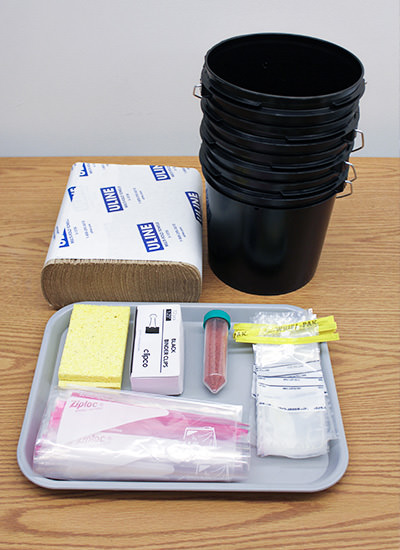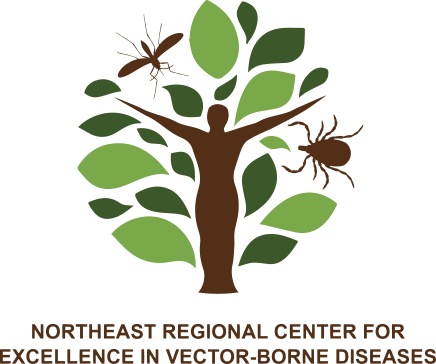NEVBD Pesticide Resistance Monitoring Program
The Northeast Regional Center for Excellence in Vector-Borne Diseases has established a pesticide resistance monitoring network covering the Northeastern region to support public health and mosquito control agencies in detecting pesticide resistance in mosquito populations.
This program offers services to our network including specimen testing at Cornell University and training resources. Please scroll below to learn more about these services.
If you’re interested in receiving periodic updates about the Pesticide Resistance Monitoring Program please sign up for our mailing list here.
Specimen Submission System
The Pesticide Resistance Monitoring Program closed the 2025 season submission system on Thursday, August 28th.
Stay tuned for announcements on the 2026 submission season.
Submitting Mosquitoes
The NEVBD Pesticide Resistance Monitoring Program submission system has closed for the 2025 season.
Consult the resources below to see the contents of each mosquito collection kit and guidelines to ensure that your specimens arrive at the Cornell facilities alive and viable for testing:
- Aedes albopictus: Submission Kit & Guidelines
- Culex pipiens: Submission Kit & Guidelines
- Culiseta melanura: Submission Kit & Guidelines
If you would like to request a mosquito collection kit or larvicide efficacy kit outside of the normal submission season, please use the Kit Request Form below:
Requesting Resistance Testing Kits
Adult Mosquito Resistance Assay Kits
If your institution or program would like to order a CDC Bottle Bioassay kit directly from the CDC, please contact USbottleassaykit@cdc.gov.
CDC Bottle Bioassay kits contain:
- Bottles
- Insecticide active ingredients
- User manual
- Instructional video
Features of the CDC Bottle Bioassay:
- Designed to determine whether a specific active ingredient is able to kill mosquitoes from a specific location at a given time.
- Technique is simple, rapid, and economical.
- Results can help guide the choice of insecticide used for spraying.
Find more information about the CDC Bottle Bioassay here
Larvicide Efficacy Testing Kits
Order a Larvicide Efficacy Testing Kit directly from Cornell University through the Kit Request Form.
Guidance Documents, Protocols, and Videos
Training Videos
Our full training video playlist is available on YouTube
Northeast Vector-Borne Disease Center - Training Video Playlist
Pesticide Resistance Assay Training Videos / Probar la resistencia de los zancudos
-
Adult Topical Resistance Bioassays - video available in English and español
- Larval Cup Resistance Bioassays - video available in English and español
Mosquito Rearing Training Videos / Criar zancudos
This video includes guidance for rearing Aedes aegypti, Aedes albopictus, Culex pipiens, and Culiseta melanura.
Video available in English and español
Our partners at PacVec have developed additional resources on the CDC Bottle Bioassay and larvicidal resistance testing. You can access these resources by visiting the PacVec Resources Website.
Guidelines and Protocols
Program Reports and Publications
Peer-Reviewed Publications
Burtis JC, Bickerton MW, Indelicato N, et al. 2022. Effectiveness of a Buffalo Turbine and A1 Mist Sprayer for the Areawide Deployment of Larvicide for Mosquito Control in an Urban Residential Setting. Journal of Medical Entomology. 59(3):903-11. DOI: 10.1093/jme/tjac017
Burtis JC, Poggi JD, Duval TB, et al. 2021. Evaluation of a Methoprene Aerial Application for the Control of Culiseta melanura (Diptera: Culicidae) in Wetland Larval Habitats. Journal of Medical Entomology. 58(6):2330-7. DOI: 10.1093/jme/tjab108
Burtis JC, Poggi JD, Payne B, et al. 2021. Susceptibility of Ixodes scapularis (Acari: Ixodidae) to Permethrin Under a Long-Term 4-Poster Deer Treatment Area on Shelter Island, NY. Journal of Medical Entomology. 58(4):1966-9. DOI: 10.1093/jme/tjab054
Burtis JC, Poggi JD, McMillan JR, et al. 2021. NEVBD Pesticide Resistance Monitoring Network: Establishing a Centralized Network to Increase Regional Capacity for Pesticide Resistance Detection and Monitoring. Journal of Medical Entomology. 58(2):787-97. DOI: 10.1093/jme/tjaa236
Lehane A, baxter L, Martin E, et. al. 2026. Insecticide resistance across the Northeast and Mid-Atlantic United States: results from 6 years of monitoring (2019-2024). Journal of Medical Entomology. 63(1):tjaf171. DOI: 10.1093/jme/tjaf171
Program Reports
Poggi J, Burtis J, Mader E, Harrington L. 2020. 2019 Pesticide Use and Resistance Monitoring in the Northeastern United States. Northeast Regional Center for Excellence in Vector-Borne Diseases. Report. Available at: https://hdl.handle.net/1813/69865
Results: Pesticide Resistance Monitoring in the Northeast Region
Visit the Pesticide Resistance StoryMap to view results of this testing program since 2019.
Questions?
If you have any questions about the program please contact pesticide@cornell.edu

